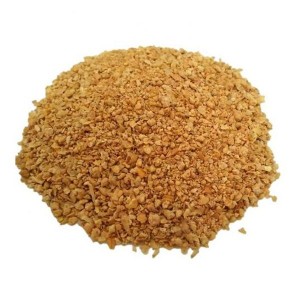With the rapid development of China’s animal husbandry industry and the increasing demand for high-quality meat, the demand for fermented soybean meal is also increasing. The demand for fermented soybean meal in China in 2022 is 863000 tons, of which the market demand for fermented soybean meal in the pig feed sector is 733900 tons; Accounting for 85.04% of the market share; The market demand for fermented soybean meal in aquatic feed and other fields is 133400 tons; Occupying 15.46% of the market share.
Definition and classification
Fermented soybean meal refers to the process of treating soybean meal through microbial fermentation. Soybean meal is the residue obtained from extracting oil from soybeans, which is rich in protein, fiber, and other nutrients. By fermenting soybean meal, its physicochemical properties can be changed, and its nutritional value and functionality can be improved. Fermented soybean meal can be divided into yeast fermented soybean meal, bacterial fermented soybean meal, and fungal fermented soybean meal according to the type of microorganisms; According to the fermentation process, it can be divided into liquid fermented soybean meal and solid-state fermented soybean meal; According to the final product use, it can be divided into feed fermented soybean meal, food fermented soybean meal, and bioenergy fermented soybean meal.
Development history
The industrialization of fermented soybean meal began in Europe and was introduced to the mainland through Taiwan, China in the 1990s. The price increase of fish meal that began at the end of 2005 led many feed breeding enterprises to recognize this product. The number of producers increased rapidly, and the quality of the product varied. After 2011, testing methods were gradually established and improved, and in 2013, it was included in the “Feed Raw Material Catalogue” of the Ministry of Agriculture (2013). Subsequently, domestic fermented feed enterprises were established one after another, and different brand products can be seen everywhere in the market. The fermented soybean meal industry in China has undergone a transformation from traditional production to modernization and technological advancement in the past few decades. The widespread application of fermented soybean meal in animal husbandry and poultry industry, as well as the continuous optimization of its functionality and nutritional value, have led to an increasing understanding and acceptance of fermented soybean meal by feed and breeding enterprises, making it play an important role in China’s agriculture and feed industry. In the future, the utilization of fermented soybean meal is also developing towards bioenergy, biochemical and other directions to reduce dependence on traditional resources.
Industrial chain
Fermented soybean meal is mainly a product prepared by solid-state fermentation using soybean meal as raw material and bacterial strains. The upstream of its industrial chain mainly involves the production of raw materials to the initial processing stage. The first link in the industrial chain is the cultivation of legumes, usually dominated by soybeans. Soybean is the main raw material, and its quality and yield directly affect the quality and production cost of fermented soybean meal. After planting soybeans, the oil extraction process is carried out to extract oil from them. The residue generated during the process of extracting oil is called soybean meal. This process is usually carried out in oil factories, and the resulting soybean meal is the main raw material for subsequent fermentation of soybean meal production.
Industry status quo
Fermented soybean meal utilizes the microbial fermentation process to remove anti nutritional factors from soybean meal and improve its feeding value. It is a large-scale feed material with great demand potential and plays an important role and significance in alleviating the shortage of high-quality protein feed resources in China. With the rapid development of China’s animal husbandry industry and the increasing demand for high-quality meat, the demand for fermented soybean meal is also increasing.
Post time: Apr-18-2024
